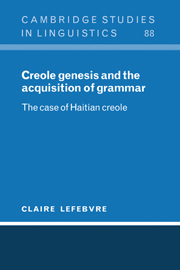
-
Select format
-
- Publisher:
- Cambridge University Press
- Publication date:
- November 2009
- January 1999
- ISBN:
- 9780511519826
- 9780521593823
- 9780521025386
- Dimensions:
- (228 x 152 mm)
- Weight & Pages:
- 0.87kg, 480 Pages
- Dimensions:
- (228 x 152 mm)
- Weight & Pages:
- 0.705kg, 480 Pages
You may already have access via personal or institutional login
Book description
This study focuses on the cognitive processes involved in creole genesis - relexification, reanalysis and direct levelling - processes which the author demonstrates play a significant role in language genesis and change in general. Dr Lefebvre argues that the creators of pidgins/creoles use the parametric values of their native languages in establishing those of the language that they are creating and the semantic principles of their own grammar in concatenating morphemes and words in the new language. This theory is documented on the basis of a uniquely detailed comparison of Haitian creole with its contributing French and West African languages. Summarizing more than twenty years of funded research, the author examines the input of adult, as opposed to child, speakers and resolves the problems in the three main approaches, universalist, superstratist and substratist, which have been central to the recent debate on creole development.
Reviews
"...[this book] is a model of careful argumentation, including clear description of the methods and assumptions involved in the underlying research...the book is admittedly written for those with special interest in pidgin and creole languages..." Linguistics
Contents
Metrics
Altmetric attention score
Full text views
Full text views help Loading metrics...
Loading metrics...
* Views captured on Cambridge Core between #date#. This data will be updated every 24 hours.
Usage data cannot currently be displayed.
Accessibility standard: Unknown
Why this information is here
This section outlines the accessibility features of this content - including support for screen readers, full keyboard navigation and high-contrast display options. This may not be relevant for you.
Accessibility Information
Accessibility compliance for the PDF of this book is currently unknown and may be updated in the future.


